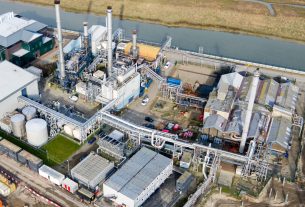The Netherlands – Avantium N.V. has secured a substantial €0.76 million grant from the EU Horizon Europe programme. This grant comes as part of Avantium’s participation in the cutting-edge research and development initiative known as Rebiolution.
The overarching goal of Rebiolution is to revolutionize the world of bioplastics, with a particular focus on designing and synthesizing biobased and biodegradable polyester blends, catalyzed by the potent potential of furandicarboxylic acid (FDCA) and other biobased monomers. These materials are envisioned for use in critical applications like plastic coating for food packaging and mulch films in agriculture.
FDCA
Avantium’s ingenious YXY Technology serves as the cornerstone of this transformative effort. This technology adeptly converts plant-derived sugars into FDCA, which, when combined with plant-based mono-ethylene glycol (MEG), metamorphoses into the sustainable plastic marvel known as PEF (polyethylene furanoate). The allure of FDCA as a monomer stems from its capacity to give rise to an array of polymers, including polyesters, polyamides, polyurethanes, coating resins, plasticizers, and other chemical products.
Notably, Avantium is poised to inaugurate the world’s first commercial FDCA facility in Delfzijl, the Netherlands, with an impressive annual production capacity of 5,000 tonnes, set to become operational in 2024.
Under the Rebiolution initiative, Avantium is prepared to supply a substantial quantity of FDCA to facilitate the development and production of a biodegradable and compostable polyester blend. The intended applications for this pioneering bioplastic are multifaceted. It is envisaged as a green alternative to fossil-based polyethylene in plastic coating for food packaging, demonstrating its potential to transform the food industry’s approach to sustainability. Furthermore, this innovative polyester blend holds promise as a replacement for the widely used butylene-adipate-co-terephthalate (PBAT) in agricultural mulch films, thereby advancing the cause of eco-conscious farming.
Biobased and biodegradable polyester
Kai Siegenthaler, a driving force behind the Rebiolution project and a prominent figure in biopolymers research at BASF, underscores the centrality of FDCA to the project’s strategy. He emphasizes its plant-based origin and its structural resemblance to purified terephthalic acid (PTA), a vital commodity chemical. By harnessing the potential of FDCA and other biobased monomers, the Rebiolution project aims to deliver a wholly biobased and biodegradable polyester that deftly navigates the terrain of processing, performance, and cost-effectiveness, all while propelling the EU’s ambitious circularity objectives.




